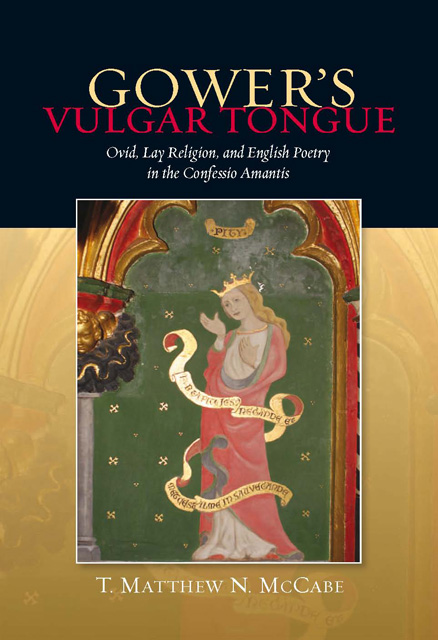Book contents
- Frontmatter
- Contents
- Acknowledgments
- Note on Abbreviations and Editions
- Abbreviations
- Introduction: Vernacularity and Public Poetry
- 1 Gower’s Ovidian Voice in English
- 2 English Writing and Lay Theology
- 3 At the Limits of Clerical Discourse
- 4 Kinde Grace
- 5 Ethics, Art, and Grace
- Conclusion: Gower and Public Poetry
- Bibliography
- Index
3 - At the Limits of Clerical Discourse
Published online by Cambridge University Press: 14 February 2023
- Frontmatter
- Contents
- Acknowledgments
- Note on Abbreviations and Editions
- Abbreviations
- Introduction: Vernacularity and Public Poetry
- 1 Gower’s Ovidian Voice in English
- 2 English Writing and Lay Theology
- 3 At the Limits of Clerical Discourse
- 4 Kinde Grace
- 5 Ethics, Art, and Grace
- Conclusion: Gower and Public Poetry
- Bibliography
- Index
Summary
Gower and “lewed clergie”
In chapter 2 I suggested that the lower register of the theological passages in the Confessio as compared to those in the Vox should be attributed in some way to Gower’s sensitivity in the English poem to pressures of vernacularity. This chapter seeks both to confirm this thesis, by examining similar tendencies in other comparatively learned portions of the Confessio—above all in the Book VII excursus on “Aristotels lore”—and to qualify it, by noting that Gower shows a similar consciousness of his lay status in the Mirour and the Vox. Comparing Gower’s lay voices in the Mirour, Vox, and Confessio is illuminating for two reasons. First, the similarity of Gower’s voice in the Confessio to more explicitly theological lay voices of the Mirour and Vox suggests that theology, albeit in more muted tones, similarly underwrites Gower’s project in the Confessio: the Confessio is a theological poem. Second, it allows us to explore further the reasons for the comparatively subdued tone of theology in the English poem. I will argue that the Confessio shows a fascination with the new possibilities of lay spirituality that were becoming increasingly visible in late medieval Christianity, and that Gower effects a movement away from “clergie” less for negative considerations—the fear of being found a Lollard—than for his enthusiasm for the intimate power available in the mother tongue.
Genius and the Limits of “Lewed Clergie”
Certainly at some level, Book VII shows the influence the “general libido sciendi” which Andrew Galloway finds at work in England in the late fourteenth and early fifteenth centuries. Galloway stresses that Piers Plowman must be set in relation to this widespread desire for knowledge, especially for knowledge “that provides or seems to provide ways to fashion the social and economic self and world,” and adduces one manuscript, Cambridge University Library MS Ll. 4.14 as his main witness. In addition to a B-text of Piers, this manuscript also contains the poetic fragment formerly called Richard the Redeless, a translation of a treatise by John of Holywood (Sacrobosco) on mathematics, and treatises on astrology and physiognomy.
- Type
- Chapter
- Information
- Gower's Vulgar TongueOvid, Lay Religion, and English Poetry in the <i>Confessio Amantis</i>, pp. 101 - 140Publisher: Boydell & BrewerPrint publication year: 2011



